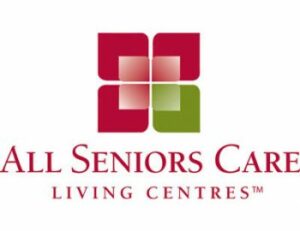Are you struggling to figure out your next steps? Our First Link® Client Support team is here to listen and help guide you through difficult times – from when you are concerned about your own, a family member or a friend’s memory, right through to the later symptoms of dementia. Call us today at 204-943-6622/1-800-378-6622 or fill out our online form and we will reach out to you.
Brain Awareness Week 2024
 Take Action for a Healthy Brain!
Take Action for a Healthy Brain!
The Alzheimer Society is celebrating Brain Awareness Week from March 11 to 17 and encouraging everyone to challenge their brain and reduce their risk of developing dementia.
Over the week, we’ll be sharing information on programs to help you keep your brain healthy, such as:
- Staying socially active
- Making healthy food choices
- Reducing stress
- And more!
Make sure to check our Facebook, Instagram, X (formerly Twitter) and LinkedIn throughout the week to learn more about how the Society can help you stay safe, be healthy and have fun! You’ll find information on programs to help you stay active and resources to help you maintain your brain health.
Visit our Brain Health page for even more tips.
Aging Brains: The Battle Against
Neurodegenerative Diseases – Free Public Event
During Brain Awareness Week, the Manitoba Neuroscience Network is hosting a free educational evening featuring lectures and presentations, followed by question and answer sessions. Speakers include Jarrad Perron and Rashmita Chatterjee, two local researchers and past recipients of the Alzheimer Society of Manitoba’s Graduate Student Fellowship Award.
Come out and listen in, then ask your questions about Aging Brains: The Battle Against Neurodegenerative Diseases.
Event details:
Tuesday, March 12, 2024, 6 – 7:30 pm
Cornish Library – 20 West Gate, Winnipeg
View the event poster here for more information and to register. Space is limited!
International Women’s Day Spotlight: Tanis & Jessica
March 8th is International Women’s Day, a time to celebrate all women and share their stories.
This year, we’re spotlighting two of the many women in Manitoba impacted by dementia. These women take each day as it comes, navigating the challenges dementia brings. They also help create change by raising awareness and reducing stigma whenever they can.
Women are more likely to be diagnosed with dementia
The recent Landmark study released by the Alzheimer Society of Canada reports that there are more females diagnosed with dementia than males, by almost a two-to-one ratio.
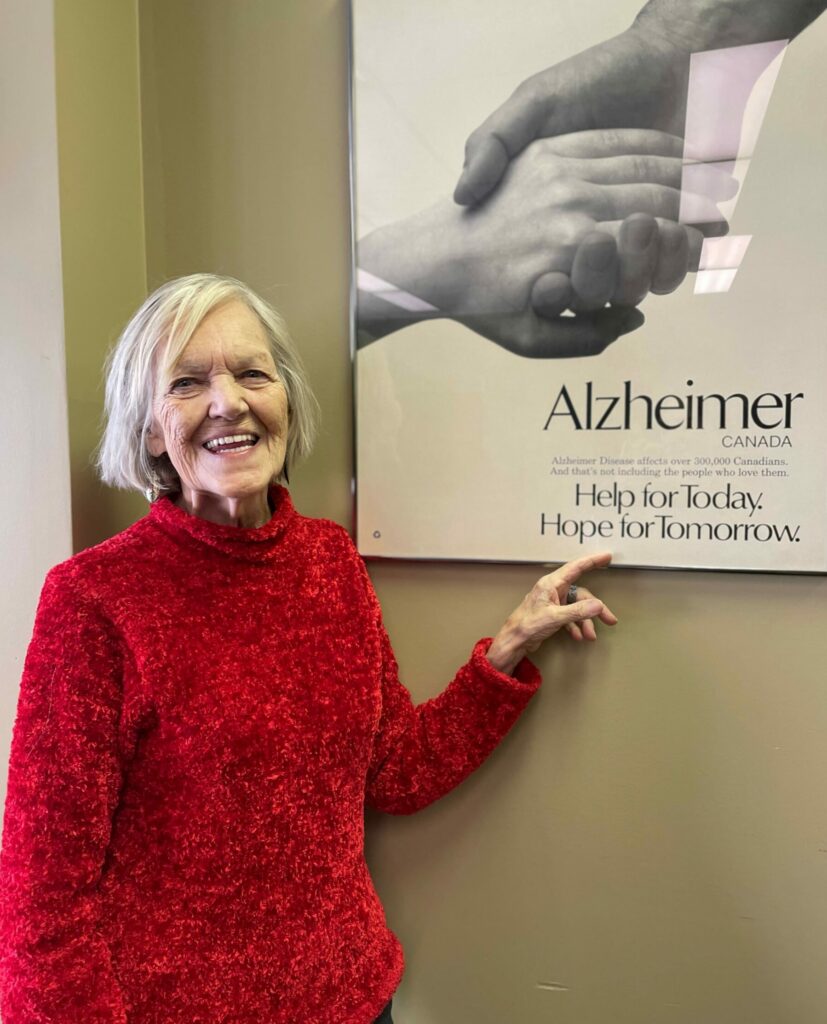 Meet Tanis who lives with dementia
Meet Tanis who lives with dementia
I have vascular dementia, but you can’t tell that by looking at me. I still live on my own and I’m still independent. If I’m struggling with something, such as finding a product in the store, I tell the clerk that I have dementia. I’ve found that people are happy to help.
People need to know that they can talk to someone with dementia. We want to be treated well… we don’t want to be treated as though we’re different from anyone else.
I don’t understand why there is such a stigma associated with the word “forget.” Why is it so bad to forget something? I want to get the word out that it’s nothing to be ashamed of. Let’s get rid of that stigma, so people can talk more openly about dementia and get the help they need.
I think that by being honest, we can create awareness in others who may not understand dementia. I do whatever I can to help others understand. Once they see us as people who just need a little help sometimes, they’ll see us as who we truly are: individuals living their lives in their own way with dementia.
Women are more likely to be care partners
The Landmark study also reports that women make up more than half of all care partners for people living with dementia. Women also provide a greater share in the total number of care hours provided.
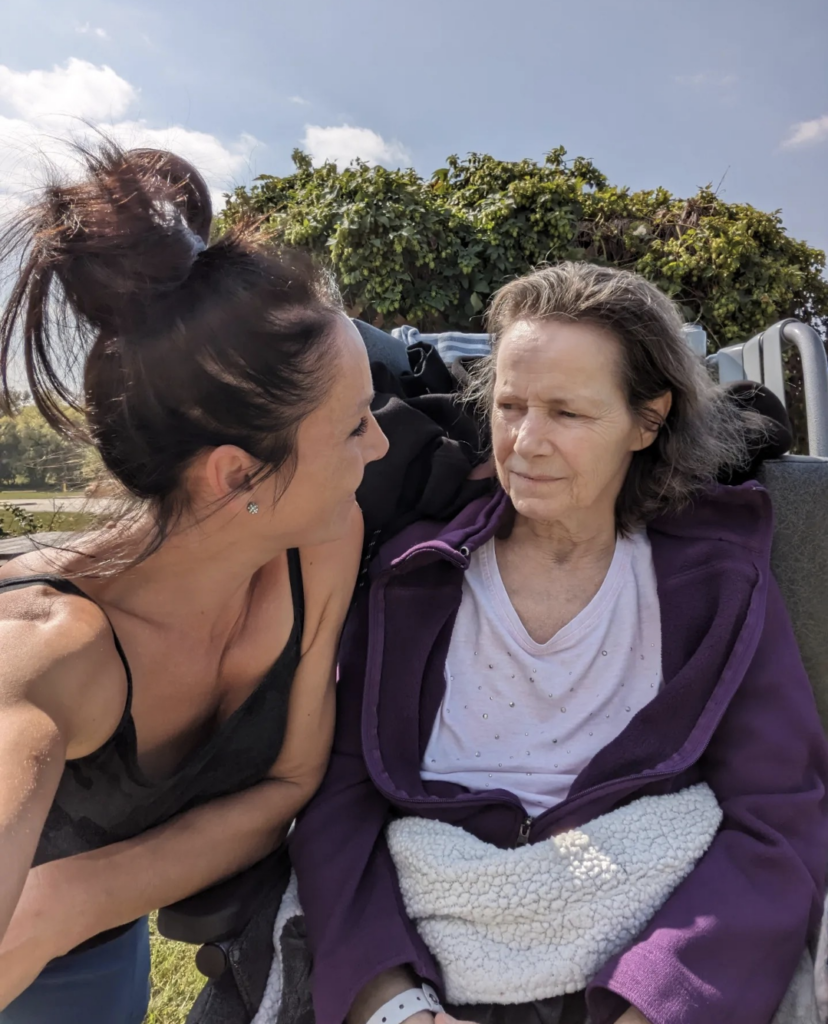 Meet Jessica Denisiuk who cares for her mom
Meet Jessica Denisiuk who cares for her mom
My mom has been living in long-term care now for a few years and I’m very involved in her care.
I feel that as women, we have this instinct to be caring. I feel things deeply and I have a lot of empathy, so when someone close to me needs care and support, I take it on.
But it also seems like there’s sometimes an expectation that women need to step up as carers. We’re expected to be nurturing and to be able to handle all the complicated emotions and feelings that a caregiving role brings.
It isn’t easy. There are many challenges and sometimes life gets in the way of providing the care you expect yourself to give. It’s important to surround yourself with people you love and care about to help you along the way. It’s also helpful to remind yourself that you’re doing everything you can, and that’s enough.
For me, having this special connection with my mom – seeing her smile at me, having her hug and kiss me and enjoying our time spent together – it’s what helps keep me going in all areas of my life. I’m so happy I can be this support for my mom.
Whether you’re someone experiencing dementia symptoms or caring for someone living with dementia, our First Link® Client Support team is here to provide you with inclusive support that fits your unique needs. Connect with us anytime by calling 204-943-6622 (Winnipeg) / 1-800-378-6622 (Manitoba) or emailing [email protected].
Considering a Move to a Personal Care Home
When someone living with dementia needs full-time care and can no longer safely or effectively manage at home with the help of family and other in-home support, it may be time to consider a move to a personal care home.
Moving into a personal care home is often one of the most challenging transitions throughout the dementia experience, both for people living with dementia and their families.
Many feelings and emotions can come up for care partners during this transition – like guilt, sadness, relief or doubt. The shift in caregiving responsibilities can also be a challenge as you navigate new routines and step away from the day-to-day care needs of those living with dementia. You may find that you have a different focus, like staying connected to the person or even advocating for quality dementia care.
“Something that often comes up for care partners navigating a housing transition are feelings of fear and anxiety over making the right choice and making sure someone living with dementia gets the care they need,” says Meagan, Client Support Coordinator at the Alzheimer Society of Manitoba.
With any transition you experience as a care partner, it’s common to feel emotions related to grief and loss. Transitions can mean someone living with dementia requires more care or that new challenges arise.
“Many aspects of being a caregiver are very difficult, long and exhausting. It’s also ok to feel relief or hope when considering the move to long-term care,” says Meagan. “We want to see quality of life for everyone and find the right balance of support.”
When thinking about which personal care home may be the best fit for someone living with dementia, going on tours of facilities that interest you can help. This also gives you an opportunity to ask questions about dementia care strategies and whether the staff uses dementia-friendly approaches when providing care.
Additionally, care partners should consider the needs and values of those living with dementia. Some things to think about are:
- Is it important to live close to friends and family?
- Do they prefer a faith-based facility?
- Do they want access to an outdoor space?
- What is the timeline to move in?
“Choosing a personal care home can be overwhelming. It’s helpful to think about how a place makes you feel when you visit or tour. Does the environment feel warm and welcoming? Are the staff engaging with the residents? Do residents seem happy?” Meagan says.
“Above all, remember that these decisions are not easy, so be really compassionate to yourself during these times.”
Our First Link® Client Support team is here to help support you throughout the process of making a move to long-term care, whether it’s helping to identify when a move may be necessary, preparing for moving day or adjusting after a move. Connect with us anytime at 204-943-6622 (Winnipeg) / 1-800-378-6622 (Manitoba) or [email protected].
Are you interested in learning more about long-term care transitions? Register for our Life in Long-Term Care Family Education session, which takes place via Zoom on March 27th from 2 – 3 pm. This presentation will provide information about the supports available within long-term care, tips and tricks when working with care teams, advocating for your family member and how to enhance your visits. Click here to register.
Visit our Housing Options webpage for an overview of the types of housing in Manitoba including personal care homes, housing eligibility, costs and even more resources.
Support Group for Care Partners with Spouses in Long-Term Care
 Finding people you can talk to about challenging situations in your life can really make a difference. As you read in the article above, experiencing transitions while caring for someone living with dementia can bring up all kinds of emotions. Moving someone you’re caring for into long-term care isn’t easy and means a lot of changes for both you and those living with dementia.
Finding people you can talk to about challenging situations in your life can really make a difference. As you read in the article above, experiencing transitions while caring for someone living with dementia can bring up all kinds of emotions. Moving someone you’re caring for into long-term care isn’t easy and means a lot of changes for both you and those living with dementia.
Care partners who have a spouse living with dementia in long-term care are presented with unique challenges as they:
- Navigate their changing roles
- Adjust to changes in self-identity
- Adjust to living separately from their spouse
- Help to support a spouse in their dementia journey
Our Support Group for Spouses of People Living with Dementia in Long-Term Care gives care partners in this position the opportunity to meet and share information about their experience of caring for someone who has transitioned into a personal care home.
The next group meets in person on March 13th from 1:30 – 3:00 at our Winnipeg office, 10-120 Donald Street. To register please call the Client Support Team at 204-943-6622.
We welcome everyone to this inclusive environment for people of different ethnicities, cultures or persons who identify as part of the 2SLGBTQ+ community.
Additional Information and Registration
For more information about current and upcoming support group opportunities, or to register for a support group, please contact the First Link® Client Support team at (204) 943-6622 or email us at [email protected]. You can also view a full list of support groups on our Support Groups page.
If connecting via email, please include your first/last name and the name of the support group you are interested in attending.
The Importance of a Healthy Smile
People living with dementia are especially prone to problems with their teeth and gums because certain dementia symptoms can cause challenges around oral care.
Keeping up with oral and dental care can help maintain quality of life, preventing things like tooth decay and gum disease.
Some difficulties for those living with dementia may include:
- Forgetting usual mouth care routines
- Struggling to do practical tasks in the right order
- Having difficulty holding a toothbrush
- Misjudging distances, like applying toothpaste onto a brush
- Showing no interest in mouth care, due to low mood, tiredness or apathy
- Forgetting about dental appointments
- Having trouble receiving dental treatment
- Having difficulty communicating pain, discomfort or distress
Since people living with dementia may be unable to communicate when they have a toothache or mouth discomfort, care partners can try to be on the lookout for signs of pain and distress such as:
- Struggling to eat food or refusing it
- Touching around the face or mouth
- Having a swollen face
- Removing and leaving out dentures
- Having disturbed sleep
- Struggling to take part in daily activities
- Expressing changes in behaviour
Scheduling regular mouth checks with a dental hygienist is another way to stay on top of potential mouth problems. Mouth checks can reveal small problems before they get worse, such as a small ulcer, poorly fitting dentures or oral disease.
Some people living with dementia may benefit from visiting Centre for Community Oral Health clinics. These clinics are not specifically dementia-friendly or have more dementia-related expertise than other dental clinics, but they provide services to underserved and vulnerable populations, including elderly and limited-mobility clients.
For more information and clinic locations throughout the province, visit the Centre for Community Oral Health website.
Give us a call if you’re looking for strategies on how to approach conversations with a dentist about meeting the needs of someone living with dementia, or if you’d like more information about oral care practices. Our First Link Client Support team is here to help.
Connect with us at 204-943-6622 (Winnipeg) / 1-800-378-6622 (Manitoba) or [email protected].
Check Out Our Spring Education Sessions!
 Join us this spring and learn about a variety of topics including life in long-term care, protecting yourself from frauds and scams, understanding responsive behaviours, the relationship between sleep and dementia and more. These sessions are free to attend and offered via Zoom.
Join us this spring and learn about a variety of topics including life in long-term care, protecting yourself from frauds and scams, understanding responsive behaviours, the relationship between sleep and dementia and more. These sessions are free to attend and offered via Zoom.
Here’s what’s coming up:
Complex Legal Situations
Most legal situations are complex and can be hard to navigate without the assistance of a lawyer. Join retired lawyer, Heather Dixon for an in-depth conversation on complex legal scenarios including the topics of Probate, Powers of Attorney duties, banking, Intestate succession Act, Committee applications and more. This session is in follow-up to Living with Dementia: First Steps – Part 2 and attendees are encouraged to have a general understanding of Wills, POA’s and HCD’s.
Wednesday, March 13 | 2 – 3 pm | Virtual via Zoom
Click here to register.
Life in Long-Term Care
Transitions are hard and can often be associated with feelings of grief, loss, sadness, anger and shame. For families, the process of moving a person living with dementia to a personal care home can be one of the most difficult transitions throughout the dementia journey. This presentation will provide information about the supports available within long-term care, tips and tricks when working with care teams and advocating for your family member and how to enhance your visits.
Wednesday, March 27 | 2 – 3 pm | Virtual via Zoom
Click here to register.
Living With Dementia: First Steps – Part 1
*Please note you do not need to attend these in order.*
The first session of a three-part information series for people supporting someone recently diagnosed with dementia. In this webinar, learn more about:
- The progression of dementia
- Alzheimer Society of Manitoba Programs and Services Overview
Saturday, April 6 | 10 – 11:45 am | Virtual via Zoom
Click here to register.
Visit the link below to view our Spring education calendar and to register for upcoming sessions.
Family Education | Upcoming Seminars
Family Education | Spring 2024 Calendar
Family Education: Next Steps Sponsored by:
Dementia Care Professional Development Series: The Complex World of Dementia Care

It’s not too late to join us for our Dementia Care 2023-2024 Professional Development Series! Sessions are geared towards health-care staff and community service providers and take place online monthly until March 2024.
Our last session titled, Cultural Safety and Senior Care, takes place on Thursday, March 21 from 2 – 3 pm. In this session, learn more about cultural safety and the historical and contemporary issues affecting health outcomes of Indigenous people. The impacts of racism and microaggression and their effects on long-term care will be explored, including an emphasis on the necessity to avoid re-traumatization of seniors living in care settings.
For only $30, you can attend this upcoming live session and get access to all 10 past session recordings!
We encourage anyone working with people living with dementia in the community, hospitals or personal care homes to register. These sessions add up to 30 completed hours of education that may be used towards professional development or continuing education hours.
Visit the Dementia Care website to learn more about all the sessions, speakers and to register now!
Heads up! Change is coming to this program so watch out for announcements in the coming months.
This event is sponsored by:
Register Now for Spring Community Partner Programs
Spring is right around the corner which means a new season of fun dementia-friendly programs! The Alzheimer Society partners with community organizations to create programs designed especially for people living with early to moderate symptoms of dementia to attend with their family members, friends or care partners.
Check out our Spring 2024 program lineup:
Dalnavert Museum Dementia-Friendly Tours
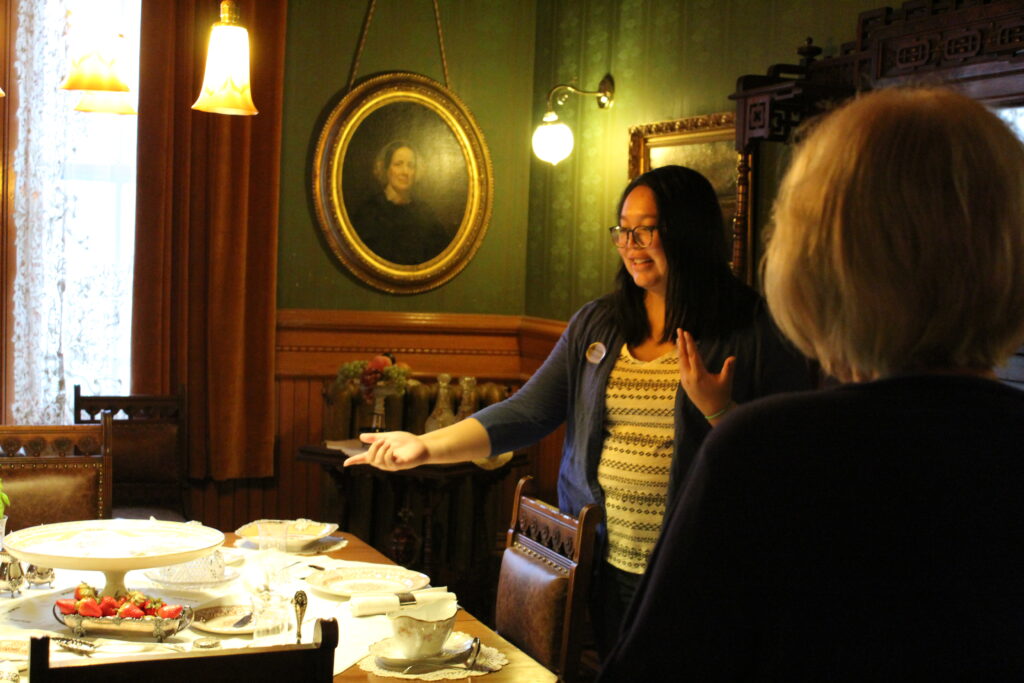 Come to the Dalnavert Museum for their monthly dementia-friendly tours. This program allows people living with early to moderate symptoms of dementia and their care partners to step back in time and explore the historic house and its collection.
Come to the Dalnavert Museum for their monthly dementia-friendly tours. This program allows people living with early to moderate symptoms of dementia and their care partners to step back in time and explore the historic house and its collection.
After your tour of the museum, join them for tea and coffee and a closer look at some artifacts.
Please note: The upper floors of the museum are only accessible by stairs. If stairs pose a barrier, there will be the option of exploring the upper floors of the house with a tour guide in the Visitors’ Centre through our virtual tour. Folding cane-seats can be borrowed free of charge during your visit and there will be seating available throughout the museum.
Monthly Program
The last Saturday of every month, 10 – 11:30 am
Cost: $24.00 (plus tax) per pair and session, $12.00 per pair and session if one of the pair is a Dalnavert Museum Member
Register today on the Dalnavert Museum and Visitors’ Centre website.
Tales Along the Trail (FortWhyte Alive)
 Enjoy Manitoba’s spring awakening! Tales Along the Trail is for people living with dementia and their care partners who are looking for a safe but exciting way to encounter the natural world. Watch as snowy landscapes turn lush green, hear the songs of migrating birds and smell the first flowers in the forest. An experienced naturalist will guide the group along FortWhyte’s gentle pathways, pointing out all spring has to offer and encouraging everyone to use their senses to explore.
Enjoy Manitoba’s spring awakening! Tales Along the Trail is for people living with dementia and their care partners who are looking for a safe but exciting way to encounter the natural world. Watch as snowy landscapes turn lush green, hear the songs of migrating birds and smell the first flowers in the forest. An experienced naturalist will guide the group along FortWhyte’s gentle pathways, pointing out all spring has to offer and encouraging everyone to use their senses to explore.
Each session will include a relaxing walk through the woods, with stops focusing on all of our senses. Participants will then have a chance to share thoughts, stories and a snack around a crackling fire or cozy indoor space. In stormy weather, we bring nature indoors.
Spring Program (8 weeks)
Wednesdays, 2 – 3:30 pm
May 1, 8, 15, 22, 29, June 5, 12, 19, 2024
Cost: $160 + GST/couple
Contact [email protected] for a link to register for this program
Now and Then: A Journey in Time (Manitoba Museum)
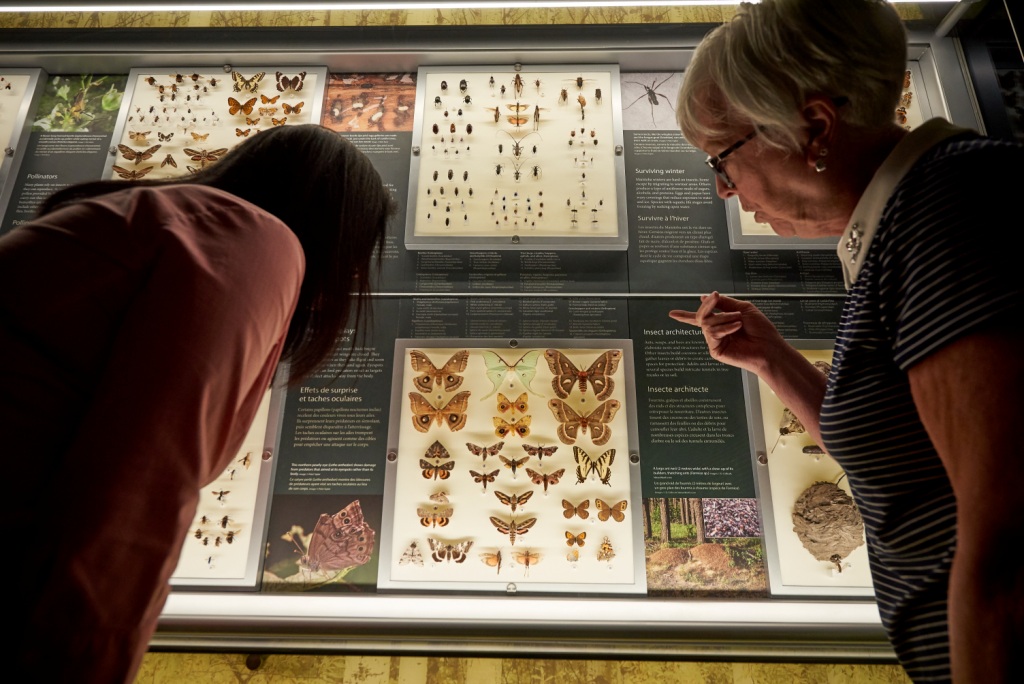 Now and Then: A Journey in Time is a program that encourages you to explore the Manitoba Museum’s many collections.
Now and Then: A Journey in Time is a program that encourages you to explore the Manitoba Museum’s many collections.
During four lively sessions led by a Museum Learning Facilitator, participants will explore old memories and create new ones through objects, activities and stimulating discussions. Each session highlights one of the Museum’s distinct galleries, from the animals of the Arctic to the far reaches of ancient Egypt and many more.
Participants are welcome to explore the Museum Galleries before or after the program.
Spring Program (4 weeks)
Fridays, 2 – 3:30
April 10, April 17, April 24 and May 1, 2024
Cost: $110 + GST/couple
Register for the Spring session on the Manitoba Museum website.
Minds in Motion® Spring Sessions
 Stay socially and physically active this spring with Minds in Motion®!
Stay socially and physically active this spring with Minds in Motion®!
Our popular Minds in Motion® program connects people living with early to moderate signs of dementia and their care partners through fitness, fun and friendship. Participants take part in a gentle chair fitness class followed by socially engaging activity and conversation. There are lots of laughs and social interaction during these sessions.
See below for all Spring sessions:
Winnipeg Locations
Faith Lutheran Church – 1311 Dakota St.
Thursdays, 10 am – 12 pm
April 11 – May 30
Register Now!
Rady JCC Fitness Centre – 123 Doncaster St.
Wednesdays, 10 am – 12 pm
April 10 – May 29
Registration opens March 12 for members & March 14 for non-members
Call to register: 204-477-7510
Riverwood Square – 1778 Pembina Hwy.
Tuesdays, 10 am – 12 pm
April 9 – May 28
Call to register: 204-275-7632
The Wellness Institute – 1075 Leila Ave.
Wednesdays, 1:30 – 3:30 pm
April 10 – May 29
Registration opens March 10
Call to register: 204-632-3900
YMCA – Elmwood-Kildonan – 454 Kimberly Ave.
Thursdays, 1:30 – 3:30 pm
April 11 – May 30
Call to register: 204-668-8140
YMCA – West Portage – 3550 Portage Ave.
Tuesdays, 1 – 3 pm
April 9 – May 28
Call to register: 204-889-8052
Regional Locations
ALTONA
The Gardens on Tenth – 140 10 Ave. NE
Mondays, 1:30 – 3:30 pm
April 8 – May 27
Call to register: 1-204-324-8945
BRANDON
Seniors for Seniors – 311 Park Ave. East
Thursdays, 1:30 – 3:30 pm
April 4 – May 21
Registration opens March 21
Call to register: 1-204-571-2050
PORTAGE LA PRAIRIE
Herman Prior Centre – 40 Royal Rd. North
Wednesdays, 1:30 – 3:30 pm
April 10 – May 29
Call to register: 1-204-857-6951
SELKIRK
Gordon Howard Centre – 384 Eveline St.
Wednesdays, 1 – 3 pm
April 3 – May 22
Registration opens March 6
Call to register: 204-785-2092
Follow Us On Social Media
Join us on Facebook, Instagram, LinkedIn and X (formerly Twitter) for the most current news, information and resources. If you’re already following us on social media, invite your friends to do the same!
X (formerly Twitter)
We Rely on Your Donations to Continue Our Work

Your gifts are put to immediate use through our helpline, support groups and education programs.
Remember. You Are Not Alone.
We are here to help you and your family no matter where you are in your dementia journey. You can reach a comforting ear by phone or get a quick response by email. Call us at 204-943-6622 (Wpg), 1-800-378-6699 (MB) or email [email protected]





